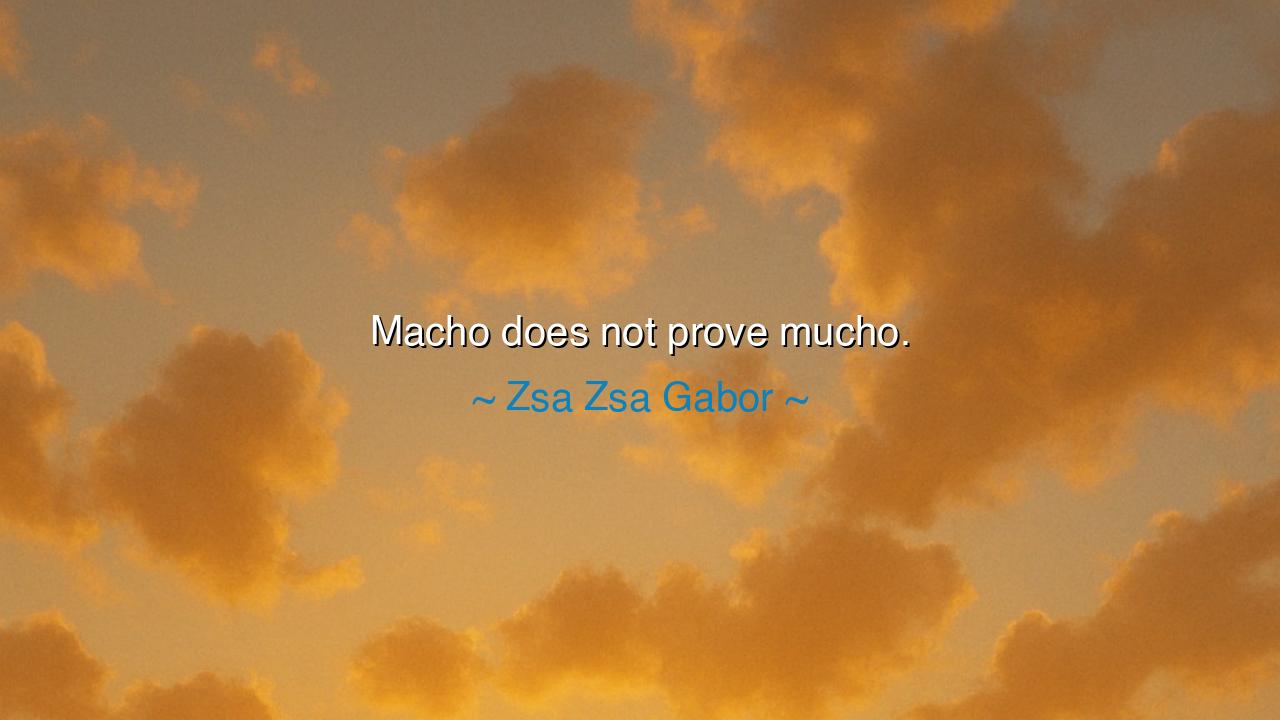
Macho does not prove mucho.






In the words of Zsa Zsa Gabor, “Macho does not prove mucho.” This playful yet profound statement unveils the timeless truth that strength and bravado alone do not define a person’s worth or true power. Macho, a term often associated with exaggerated masculinity, confidence, and force, may gain outward admiration, but it does not prove the fullness of one's character or their true impact on the world. Gabor cuts through the noise of superficial displays and points to something deeper: that real worth lies not in showing off strength but in substance, in the quiet power of integrity, wisdom, and compassion.
In the ancient world, the warriors of Homer’s epics, like Achilles and Hector, were celebrated not just for their strength on the battlefield, but for their complex, layered humanity. Achilles, the great hero of the Iliad, is a man defined not merely by his prowess in battle, but by his rage and the consequences it brings upon his soul. His bravado, his macho persona, is ultimately insufficient to save him from the tragic path he chooses. Hector, his counterpart, though not as physically powerful, is revered for his honor, his duty, and the love he has for his family and city. These heroes teach us that the truest power lies not in boasting of strength, but in choosing to act with wisdom and virtue, even in the face of danger.
The Stoics of ancient Greece, particularly Epictetus, held that true strength comes not from the outward show of might, but from the control of the inner self. A man who controls his impulses, who is able to resist vanity and pride, is a man of real power. The Stoic philosopher would have found machoism to be a flawed pursuit—one based on external displays of strength rather than the quiet, unshakable resolve of the spirit. For Epictetus, it was the ability to remain at peace, to find strength through reason and character, that truly demonstrated a person’s greatness, not the noise of empty bravado.
Consider the story of King David in the Bible, a man who, though small in stature compared to the towering Goliath, demonstrated that true strength is not always about physical might. David faced the giant armed with nothing but his faith and a slingshot. His victory over Goliath was not due to his physical power, but to his courage, wisdom, and humility. In David, we see that it is not the loud, brash show of strength that defines greatness, but the quiet strength that comes from within—the ability to remain grounded, focused, and true to one's values in the face of overwhelming odds.
The ancient Samurai, known for their unmatched combat skills, also exemplified this distinction between macho and true power. The Samurai were not just warriors of physical strength; they were also philosophers, poets, and men of deep spiritual conviction. Their code of honor, the Bushido, emphasized virtues such as respect, loyalty, and self-discipline—qualities that go far beyond the pursuit of sheer physical strength. In their quiet commitment to these virtues, the Samurai displayed the type of strength that Gabor alludes to—a strength built on inner integrity and wisdom rather than the sheer force of a display.
The lesson in Gabor's quote is one that transcends gender and culture. It is a reminder that true power is found not in the outward show of force, but in the quiet strength of character, wisdom, and purpose. Machoism, in all its forms, is fleeting and ultimately hollow—it may win admiration, but it does not prove much. The man who speaks the loudest or boasts the most does not necessarily hold the truest strength. The man who acts with quiet integrity, who chooses wisdom over bravado, and who lives his life with purpose and humility, is the one whose true power will endure.
In your own life, consider how you might embody this lesson: avoid the trap of loudness and superficial displays. Seek instead to cultivate strength through character and wisdom. True greatness is not measured by how loudly you can declare your strength, but by how you live, by how you act when no one is watching, and by how deeply you embody the values that matter most. In the end, it is not the outward display that defines you, but the quiet power of your actions, your integrity, and your ability to remain true to yourself and those around you.






AAdministratorAdministrator
Welcome, honored guests. Please leave a comment, we will respond soon